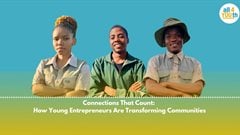
Top stories






More news















People continuously talk about it and they have many ideas around different Wi-Fi business models. So, how do we cost-effectively and sustainably provide the Wi-Fi consumers and businesses are demanding?
![[AfricaCom 2014] Wi-Fi: The new basic human need](https://biz-file.com/c/1411/240092.jpg)
Delegates at the Broadband, Technologies and Models session at AfricaCom on Tuesday heard from CEO of Nomosphere, Ellie Hagopian, on Wi-Fi and changing Wi-Fi business models; as well as from Alan Knott-Craig Jr, Founder and CEO of Project Isizwe, on free Wi-Fi and internet access as a utility.
Hagopian kicked off the session by introducing the four most common categories Wi-Fi business models fall into:
She says that everyone has a theory about Wi-Fi - what the future of Wi-Fi is going to look like and what the 'right' business model will be. According to Hagopian there isn't only one 'right answer'. Because technology is changing so fast, the right answer now can look very different to the right answer two or three years from now.
"When I say technology, I'm not talking about Wi-Fi and Wi-Fi radios - that to me is underlying infrastructure that's important to make some of the other stuff work, but if you have a Wi-Fi router that's installed and connected to the internet without something else being there, then none of these models are actually able to work and it's not going to be very interesting because you're not delivering any consumer services.... And it's the consumer services, the software, the packaging and the business models which make this interesting and complex."
With each of the aforementioned business models, there come some challenges that need to be taken into consideration:
- They don't know how to make money from it or often times they make a loss.
- It's not really optimal unless it's either specifically a loss leader where someone has proved the internal ROI (e.g. If the operator offers public Wi-Fi hotspots, people will choose its service because of the Wi-Fi offer); or it's having a measurable social impact.
- Users don't want to pay. They will if they absolutely need to, but it's a grudge purchase when it comes to airports and hotels.
- It's expensive.
- If a venue is trying to build its own network, not in partnership with one of the bigger operators, it's competing with operators for Wi-Fi provision in key venues.
- Consumers don't like it (e.g. Apps like Weblock lets you block ads in any and all apps effortlessly)
- It can work sometimes, but consumers find it intrusive and annoying when it's irrelevant.What's the answer?
Hagopian suggests the answer lies in combining the muscle of a large operator with the focus and nimbleness of a small one.
"Ultimately there's a combination of B2C big telcos that will install infrastructure. They bring capital, telecoms expertise and wholesale capabilities - these are the big players partnering either with innovative divisions, or smaller software companies that actually focus on software services in B2B.
"Smartphones and mobile technology is actually forcing a lot of big industries to figure out how to innovate and how to partner with smaller companies."
"Public and private sectors shouldn't compete, but rather work together. Competition should be based on the best solutions, not a monopoly of infrastructure," says Hagopian.
Moving on to the topic of free Wi-Fi, Knott-Craig Jr took the stage and shared his journey and how he managed to roll out government funded free Wi-Fi through a non-profit organisation called Project Isizwe.
Initially, the project's aim was to figure out a way to make it affordable for the government to subsidise the internet for everyone - but particularly lower income communities.
"We considered the four factors you need to consider when you're building a telco: capex, sites, labour and bandwidth. We asked ourselves how we were going to drop those costs until we got to a point where a cost per gig was something that could be paid for by the government on behalf of consumers."
The access medium that was decided upon was Wi-Fi because most affordable smartphones that Android has been installed on, has Wi-Fi built in. Also, over 50% of households (this is often one device per household that is shared amongst a number of people) in South African townships have access to Wi-Fi enabled smartphones.
The second factor was sites. The only way to get around this factor is by working with the government - since they own everything... from lampposts, to parks, libraries, schools etc. "When you realise you can put your equipment on all of those buildings, not only don't you have to pay rent, but you get the electricity as well."
When it came to labour costs, he says that's where Wi-Fi was once again a winner because instead of paying an engineer R2000 per hour, they simply needed someone to climb a mast, bolt an antenna on top of the mast, plug in the electricity, and climb down the mast - for R100 per hour.
Lastly, bandwidth was the big trick. After no luck at Telkom, he approached Neotel which jumped on board instantly.
"We had covered the four cost components, and the cost came down to 15c per gig for access. I then needed to find a municipality to help me do it." After approaching the Municipality of Stellenbosch, as well as City of Cape Town with no luck, he went to the Mayor of Tshwane who bought the dream.
At this time, Tshwane has got capacity for 1.4 million people on free Wi-Fi in townships. Subsequently Project Isizwe approached the Western Cape, and is now being rolled out in Robertson and Atlantis for about 20,000 people each. Now that the floodgates are opening for Project Isizwe, hopefully these numbers, as well as free Wi-Fi areas will just keep on increasing and expanding.
The fact of the matter is that internet enables people: it enables them to search for jobs, email CVs, start online businesses, it makes learning and education easier and more reliable, and it advances healthcare.
In closing, he left the audience with a great analogy of what Project Isizwe is about: "If you think of the continent of Africa and the country of South Africa as a desert - water being bandwidth, then we are living in a desert. And everywhere in the desert you have vending machines with Valpre water... this is great for the guys with money, because they can go buy the water. But if you don't have money, you are staring at the guys drinking their Valpre water.
"What we are saying is that underneath the ground there are now rivers of water which no one is using. Project Isizwe tries to drop a bore hole into that water and bring tap water to the surface so that everybody can get some water. It might not taste that good, and there may be a queue, but it's better than nothing."
![[AfricaCom 2014] Wi-Fi: The new basic human need](https://biz-file.com/c/1411/240083.jpg)


